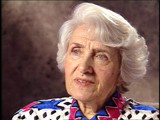You searched for: ust众筹理财项目定制开发【tg���������@ek7676】平台包网搭建unit众筹理财项目定制开发【tg���������@ek7676】平台包网搭建gnogu7gctt
<< Previous | Displaying results 1491-1500 of 1751 for "ust众筹理财项目定制开发【tg���������@ek7676】平台包网搭建unit众筹理财项目定制开发【tg���������@ek7676】平台包网搭建gnogu7gctt" | Next >>
-
Drawing of shoes by a Jewish teenager in hiding
ArtifactJewish teenager Ava Hegedish drew this poignant picture of her mother's well-worn shoes while in hiding. It was drawn while Ava was in hiding at a farm near Belgrade, Yugoslavia (now Serbia), between 1941 and 1944. Once Nazi Germany and its Axis partners partitioned Yugoslavia and Belgrade fell under German control, Ava’s father thought the family’s best chance of survival was to separate and go into hiding. Ava ended up at a farm with some extended-family Serbian relatives. Because she…
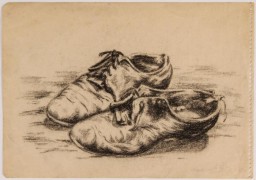
-
"St. Louis" arrives in Antwerp
FilmThe German ship SS "St. Louis" departed from Hamburg for Cuba with almost 1,000 Jewish refugees on board on May 13, 1939. Most of the passengers had Cuban landing certificates. However, the Cuban government invalidated the certificates. When the "St. Louis" reached Havana on May 27, most of its passengers were denied entry. After the United States also refused to accept the refugees, the ship returned to Europe, docking at Antwerp. Britain, France, Belgium, and the Netherlands then agreed to accept the…
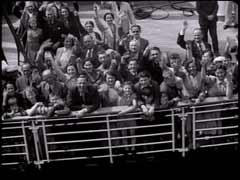
-
Treatment of US POWs
FilmA former US prisoner of war (POW), United States Navy Lieutenant Jack Taylor, testifies to the treatment he and other American POWs received in the Mauthausen concentration camp in Austria.
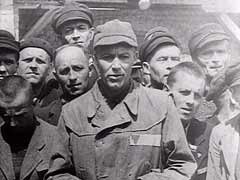
-
Defendants enter pleas at Nuremberg Trial
FilmAfter the defeat of Germany, the Allies tried leading state and party officials and military commanders of the Third Reich before a tribunal of military judges from the Soviet Union, Great Britain, France, and the United States. This International Military Tribunal tried 22 major war criminals during what is commonly known as the Nuremberg Trial, which lasted from November 1945 to October 1946. This footage shows the accused entering pleas following their indictment on charges of crimes against peace, war…
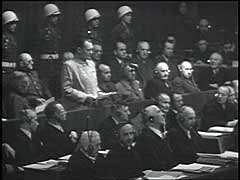
-
Ruth Moser Borsos describes roll call (Appell) in Bergen-Belsen
Oral HistoryRuth moved to the Netherlands after Kristallnacht (the "Night of Broken Glass") in 1938. She and her father had permits to sail to the United States, but Germany invaded the Netherlands in May 1940 and they could not leave. Ruth was deported to the Westerbork camp in 1943 and to the Bergen-Belsen camp in Germany in 1944. After an exchange agreement with the Allies broke down, Ruth was interned near the Swiss border until liberation by French forces in 1945.
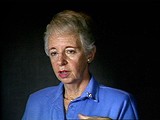
-
Edward Adler describes deportation to and arrival at the Sachsenhausen camp
Oral HistoryEdward was born to a Jewish family in Hamburg. In 1935, the Nuremberg Laws prohibited marriage or sexual relations between German non-Jews and Jews. Edward was then in his mid-twenties. Edward was arrested for dating a non-Jewish woman. Classified as a habitual offender, he was later deported to the Sachsenhausen concentration camp, near Berlin. He was forced to perform hard labor in construction projects. Edward had married shortly before his imprisonment, and his wife made arrangements for their…
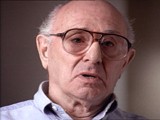
-
Edward Adler describes forced labor and conditions in the Sachsenhausen camp
Oral HistoryEdward was born to a Jewish family in Hamburg. In 1935, the Nuremberg Laws prohibited marriage or sexual relations between German non-Jews and Jews. Edward was then in his mid-twenties. Edward was arrested for dating a non-Jewish woman. Classified as a habitual offender, he was later deported to the Sachsenhausen concentration camp, near Berlin. He was forced to perform hard labor in construction projects. Edward had married shortly before his imprisonment, and his wife made arrangements for their…
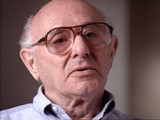
-
Hanne Hirsch Liebmann describes conditions in the Gurs camp
Oral HistoryHanne's family owned a photographic studio. In October 1940, she and other family members were deported to the Gurs camp in southern France. In September 1941, the Children's Aid Society (OSE) rescued Hanne and she hid in a children's home in Le Chambon-sur-Lignon. Her mother perished in Auschwitz. In 1943, Hanne obtained false papers and crossed into Switzerland. She married in Geneva in 1945 and had a daughter in 1946. In 1948, she arrived in the United States..
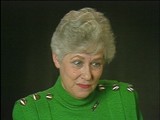
-
Hans Heimann describes Italian aid to Jews
Oral HistoryThe Germans annexed Austria in March 1938. In 1939, Hans fled first to Hungary and then to Italy. He and his parents were interned in various towns. Hans's father became ill and died in 1940. In 1943, Hans and his mother were warned of German plans to deport Jews from Italy to Poland. They moved to smaller towns until liberation by the British in August 1943. Hans worked as an interpreter for the Allies until 1945, when he worked for the American Jewish Joint Distribution Committee and helped resettle…
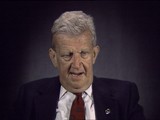
-
Blanka Rothschild describes the beginning of the German invasion of Poland when she and her family were in Lodz
Oral HistoryBlanka was an only child in a close-knit family in Lodz, Poland. Her father died in 1937. After the German invasion of Poland, Blanka and her mother remained in Lodz with Blanka's grandmother, who was unable to travel. Along with other relatives, they were forced into the Lodz ghetto in 1940. There, Blanka worked in a bakery. She and her mother later worked in a hospital in the Lodz ghetto, where they remained until late 1944 when they were deported to the Ravensbrueck camp in Germany. From Ravensbrueck,…
